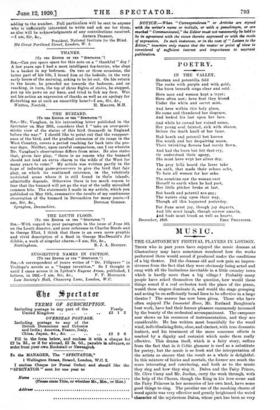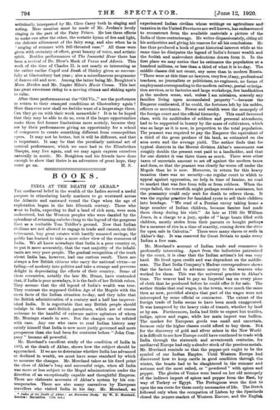M US I C.
THE GLASTONBURY FESTIVAL PLAYERS IN LONDON. PROSE who in past years have enjoyed the music dramas at Glastonbury may have sometimes wondered how the works performed there would sound if produced under the conditions of a big theatre. Did the dramas old and new gain an impres- siveness from the fact that they were obviously being acted and sung with all the limitations inevitable in a little country town which is hardly more than a big village ? Probably many people have asked themselves the question, how would these things sound if a real orchestra took the place of the piano, would these singers dominate it, and would the stage grouping and acting be on sufficiently broad lines to be effective in a large theatre ? The answer has now been given. Those who have often enjoyed The Immortal Hour, Mr. Rutland Boughton's best work, have had their former pleasure enormously increased by the beauty of the orchestral accompaniment. The composer now shows us his resources of instrumentation, and they are considerable. He has written most beautifully for the wood wind, individualizing flute, oboe, and clarinet, with true dramatic instinct, and his treatment of the more sonorous effects is marked by a dignity and restraint which make them really effective. This drama itself, which is a fairy story, suffers from the fact that in it Celtic glamour is used as a substitute for poetry, but the music is so fresh and the interpretation of the artists so sincere that the result as a whole is delightful. In this mixture of fairies and mortals, the former are much the more interesting and convincing, and both as to the music they sing and how they sing it. Dalua and the Fairy Prince, Mr. Clive Carey and Mr. Jordan, carry the work through, with the help of the Chorus, though the King in his love scene and the Fairy Princess in her memories of her own land, have some good things to sing. The peculiar use of the mocking chorus of wood spirits was very effective and greatly heightened the weird character of the mysterious Dalua, whose part has been so very artistically interpreted by Mr. Clive Carey both in singing and meting. Here mention must be made of Mr. Jordan's lovely singing in the part of the Fairy Prince. He has three effects to make one after the other, the ecstatic hymn of fire and light, the delicate allurement of the fairy song, and also when he is " singing of summer with full-throated ease." All these' were given with certainty of effect, great beauty of voice, and artistic spirit. Besides performances of The Immortal Hour there has been a revival of Dr. Blow's Mask of Venus and Adonis. This work of the time of Charles II. is not nearly so interesting as the rather earlier Cupid and Death of Shirley given so success- fully at Glastonbury last year; also a miscellaneous programme of dances old and new. Among the latter being.Mr. Boughton's Moon Maiden and Mr. Napier Miles's. Music Comm. This last has great sweetness rising to a moving climax and sinking again to calm.
After these performances at the "Old Vic.," are the performers to return to their .eramped conditions at Glastonbury again ? More than ever now shall we feel the want of a larger stage there. Can they go on with their work meanwhile ? It is to be hoped that they may be able to do so, even if the larger opportunities make them feel former limitations more acutely, because they are by their performances giving an opportunity for a school of composers to create something different from cosmopolitan opera. It may not be better, but it will be different, and that is important. It may be that the peculiarly national art of musical performance, which we once had in the Elizabethan Masque, may live again, and we may again express ourselves naturally in music. Mr. Boughton and his friends have done enough to show that theirs is an adventure of great hope, they







































 Previous page
Previous page